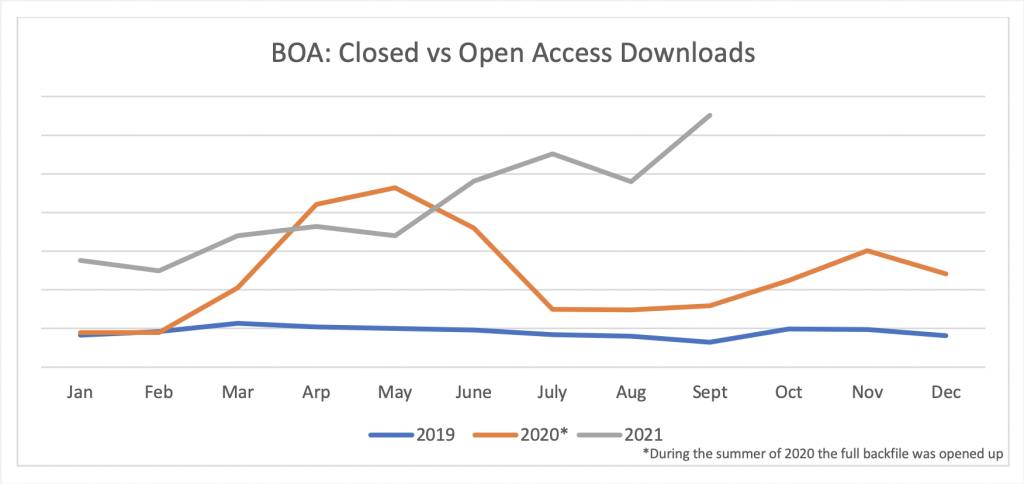by Vivian Berghahn, Managing Director and Journals Editorial Director
In 2021 Berghahn Open Anthro entered its second year as a ground-breaking three-year pilot. In this two-part blog post we will share how its journey has brought together various stakeholders to realize the goal of attaining an equitable path to open access using the subscribe-to-open (S2O) model.
Our intention is to outline how stakeholders have supported the pilot: as a researcher by urging their library to maintain subscriptions for the journals they value as a reader and author; as a librarian by advocating that budgets remain allocated to those journal(s) in order to support their faculty needs; as a funder by endorsing the model and channeling block grant funds to supplement strained library resources; and as a publisher considering their next steps for open access, by implementing the model for those journals that fit.
These actions all contribute to furthering a model that offers a path to open access that can be sustainable, especially for journals in the social sciences and humanities, with this kind of ongoing support.
In Part I of this post, we first set out the broader open access publishing environment a publisher like Berghahn finds itself in and how and why the APC-free solution of S2O resonated. We will then share the range and forms of librarian participation and researcher support this model draws from. Finally, in Part II, we will share the disciplinary foundations of our particular pilot and conclude with an update on where we are now and where we should all be headed.

The Power of a Discipline-oriented Approach
With the ever-shifting publishing landscape in mind, the big takeaway for Berghahn in evolving our open access strategy across our books and journals has been the importance of aligning any open access initiatives with the readiness of the field – and funding sources – in question. Open access needs and timelines differ across disciplines and so we have found it vital to be attuned to the right approach and vary our strategies accordingly. However, a common concern remains to be APC-free whenever possible.
In shaping our Berghahn Open Anthro pilot, an APC-free strategy meant aligning with a discipline that has an engaged collective of open access advocates that could be mobilized in support of the undertaking, which is a key feature of the S2O model. For us, the right match was found in anthropology, a discipline we have long served as both a book and journal publisher. Anthropologists are some of the most vocal in expressing their support for open access as a means of maximizing the impact of their work, especially in order to benefit the communities where they conduct their research. They have not only been the inspiration for this pilot but served as compelling advocates for its implementation.
Consequently, the foundation of this pilot was laid by Libraria, a collective of researchers who seek a scholarly communication system that is not only community-controlled, but more open and diverse. Libraria’s approach to helping existing journals work with their publishers to flip to open access is one that remains acutely aware of the economic realities that journal editors and their societies face when it comes to sustaining a journal. Even when the open access benefits for a journal’s authors and readership are clear, delivering a sustainable open access solution, especially if it is to be equitable, can be a daunting undertaking.
Daunting as it was, working closely with Libraria to mold, reshape, and ultimately go live with the pilot, thanks also to support from Knowledge Unlatched, we sought – and dare we say have since delivered – just that. For instance, since our launch in 2020, the journals in our Berghahn Open Anthro collection have published over 400 open access articles across a wide geographic spread. Prior to that (between 2017 and 2019), the same group of journals published just 14 (APC-funded) OA articles in total. Usage and readership have also grown exponentially.
As we now look ahead to our third year of the pilot, we are delighted to welcome a new journal to the collection and will be working to transition Social Anthropology/Anthropologie sociale to APC-free open access as of 2022 should we successfully migrate its library holdings over to the S2O model. Members of The European Association of Social Anthropologists (EASA), voted overwhelmingly to take their flagship journal open access using the BOA-S2O model. By addressing membership concerns that they secure an open access alternative to the journal’s prevailing APC-centric model, the executive sought to deliver a model “that is organized fairly, sustainably and in a way that supports our members.” It is truly a community-controlled discipline-led open access initiative in action.
Towards a more diverse and democratic open access publishing ecosystem
Subscribe to open is very much a model designed for those publishers and journals who have successfully served diverse publishing communities – often at the margins of more conventional research fields – for reasons other than scale. As such, it offers a compelling opportunity for stakeholders to support publishers and journals, of all sizes, and especially those mission-driven publishers who are vital for balancing out the publishing ecosystem.
In adopting the model, geographically diverse libraries have a cost-effective and equitable way to underwrite the journals their faculty endorse while also providing valuable open access publishing and readership opportunities across their institution, throughout their surrounding communities, and beyond. It is also an illuminating example of the important role for researchers in the library collections curation process as serials policies evolve in an open access context.
This has been quite some journey so far, but we remain cautiously optimistic as we look ahead to the next phase – it is, after all, what the stakeholders throughout this process have asked for: equitable, APC-free, community-controlled, sustainable open access from the journals they trust.
